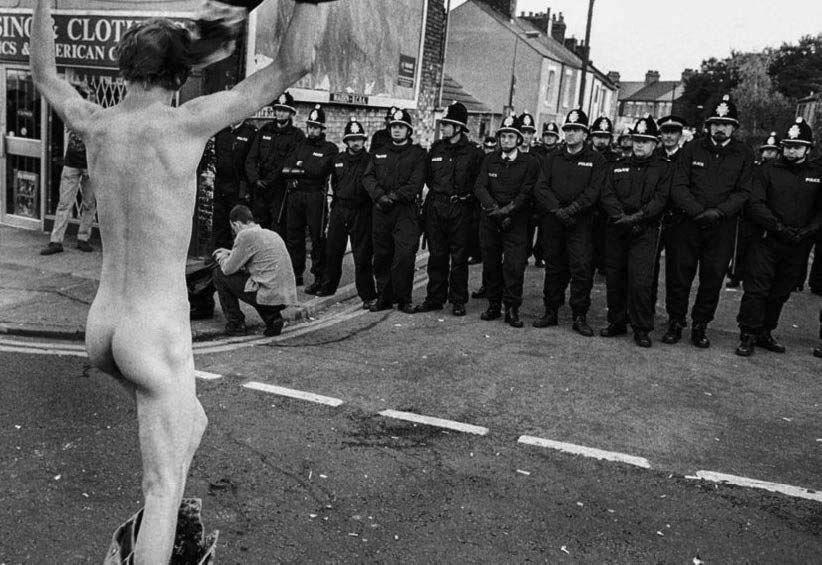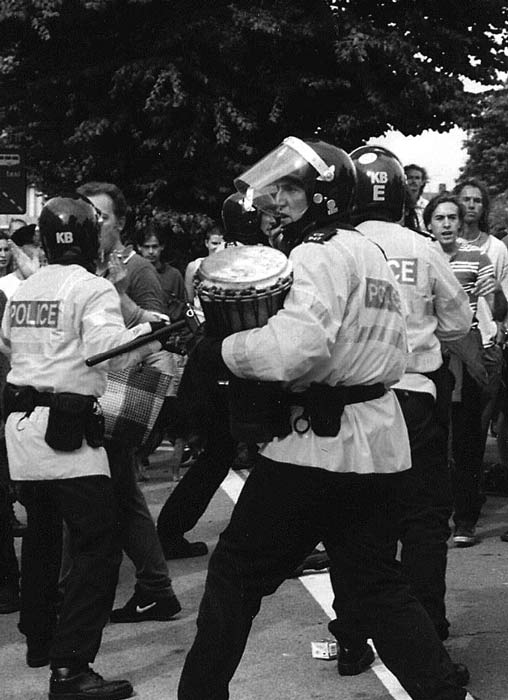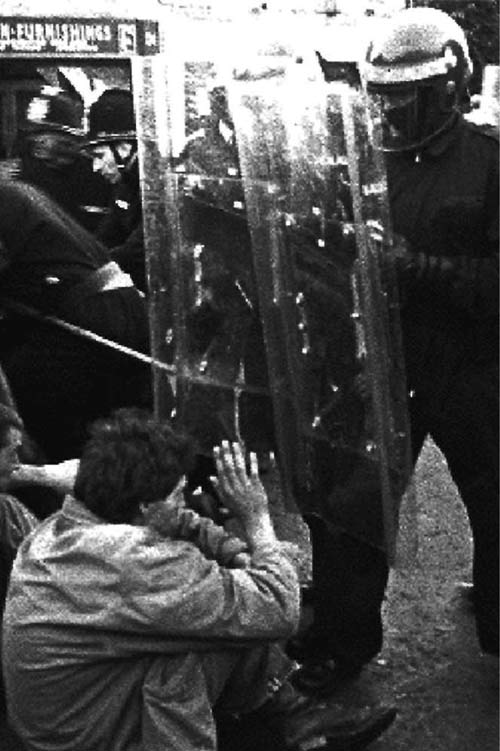
Police Clampdown On RTS
Several RTS activists have recently been arrested in a series of raids. But police action fails to intimidate Reclaim the Streets. Words by Sally Chesworth and Andy Johnson.
Squall 14, Autumn 1996, pg. 16.
A national police clampdown on the activities of Reclaim the Streets has followed July’s successful street party on the M41 in London (see page 26).
RTS organisers have been arrested before, during and after events - suggesting the police are making use of the surveillance to which RTS groups have been subject for many months.
A London activist was arrested in August, shortly after July’s M41 party, following two police raids in which documents were seized.
A Birmingham activist was also arrested, following a raid, shortly after a successful street party in Birmingham in August.
In Brighton 80 people were arrested as they attempted to hold a “beach party” in the streets in August; and in Cambridge in September, riot police ensured a peaceful party in Mill Street ended with arrests and trouble.
In Brighton there were reports of police from outside the area picking out known organisers for the local constabulary to “take out” on the day of the action, including legal observers. In Cambridge organisers were also isolated and arrested on the day of the party.
In London police seized computers and papers during searches of the group’s north London office and an activist’s home on August 3rd. The raids began with the arrival of five police officers at the RTS base at about 8am. Another four turned up at the activist’s door shortly after. He was told he was being arrested in connection with damage to the motorway and held for eight hours at Hammersmith Police Station. His diary and various documents were confiscated.
At the office the police were allowed in by other occupants of the building who were shown a form (a warrant card) which they took to be a search warrant. The team had spent 15 minutes taking photographs using digital cameras (which put images straight onto floppy disc) before anyone from RTS knew they were there.
When confronted by an RTS organiser, who told them their presence was illegal, one officer replied, “but they let us in”. She told them to leave. One officer was recognised as from the Forward Intelligence Team, which had been monitoring RTS’ movements in the run-up to the street party, and the other four were thought to be from the CID.

A woman who witnessed events complained to the officers that for all the occupants’ knew, they could be terrorists planting a bomb on the premises, to which the officer retorted: “I think we’re the ones looking at the terrorists.”
The five returned in the early afternoon with a warrant and several uniformed officers. Jacklin, of RTS, refused them entry. “They kept knocking for half an hour and said they were going to break the door down. Eventually they let themselves in,” she said.
Three computers were removed but the group say the police will not find much information of use. The files did not contain street party plans and the database is protected with Pretty Good Privacy which is more difficult to crack than a single pass word. The police are likely to keep the computers for two to three months and there are concerns about what state the material will be in when it is handed back.
RTS say they expected there would be a response to such a bold and well-attended action which the police had tried so hard to stop. The group’s activities were under close scrutiny in the days before the street party, with the office being watched from a house opposite and members being followed as they went about the final preparations.
“It was quite a performance,” recalled one member. “As we cycled down the side streets near the office we would go past them sitting in cars with mountain bikes in the back talking on their radios. They looked really embarrassed. It was a wasted effort because we had planned for all that.”

The arrested activist, Paul M, is bailed until October 28th when he will learn whether any charges will be brought. A second person is wanted for questioning.
In Birmingham an activist was arrested by eight uniformed officers on charges of conspiracy to cause criminal damage, ie digging up a public highway. RTS Birmingham believe he was held in order that his flat could be searched.
RTS London said that as laws were there to maintain the status quo, it was necessary to challenge some of them to bring about radical change. Therefore they expected police harassment.
“Seven thousand people committed the offence of obstruction of the highway - the police chose to arrest eight on the day for public order [offences] and one after the event,” an activist told Squall. “Their historic tactic of isolating individuals from the mass only works in the context of top-down organisations. For us it confirms the importance of attempts to organise in a non-hierarchical way. Moments like this show the true nature of the judicial system - promotion of planet-destroying industries and activities is encouraged, the way smoothed. Those opposing this destruction are arrested and intimidated.”
Related Articles
For a menu of many other Squall articles about the Anti-Roads Movement, including protest camps, Reclaim The Streets and more click here
Links
Reclaim The Streets - https://rts.gn.apc.org (as of 2024)
